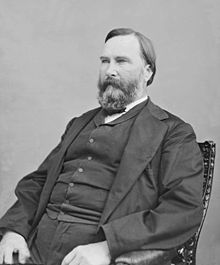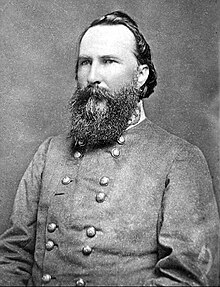James Longstreet
Confederate Army general
James "Pete" Longstreet (8 January 1821 – 2 January 1904) was an officer in the Confederate army during the American Civil War. Though he was a Confederate in the war, after the war, he joined the Republican Party and supported rights and freedoms for former slaves, a move that made him unpopular with many former Confederates.





| This article about a military figure is a stub. You can help out with Wikiquote by expanding it! |
Quotes
edit- General, I have been a soldier all my life. I have been with soldiers engaged in fights by couples, by squads, companies, regiments, divisions, and armies, and should know, as well as any one, what soldiers can do. It is my opinion that no fifteen thousand men ever arranged for battle can take that position.
- As quoted in General James Longstreet: The Confederacy's Most Controversial Soldier: A Biography (1993), by Jeffry D. Wert, New York: Simon & Schuster, p. 283
- That man Grant will fight us everyday and every hour until the end of the war.
- As quoted in The Civil War (documentary) by Ken Burns
- The surrender of the Confederate armies in 1865 involved: 1. The surrender of the claim to the right of secession. 2. The surrender of the former political relations of the negro. 3. The surrender of the Southern Confederacy. These issues expired on the fields last occupied by the Confederate armies. There they should have been buried. The soldier prefers to have the sod that receives him when he falls cover his remains. The political questions of the war should have been buried upon the fields that marked their end.
- Letter to the New Orleans Times (19 March 1867)
- The highest of human laws is the law that is established by appeal to arms. The sword has decided in favor of the North, and what they claimed as principles cease to be principles, and are become law. The views that we hold cease to be principles because they are opposed to law. It is our duty to abandon ideas that are obsolete and conform to the requirements of law.
- Letter to the New Orleans Times (8 June 1867)
- Great God! I thought to myself, how my heart swells out out to such magnanimous touch of humanity. Why do men fight who were born to be brothers?
- The New York Times (24 July 1885)
Attributed
edit- If it wasn't about slavery, then I don't know what else it was about.
- Regarding the American Civil War, as quoted in Letter to the Fauquier Times Democrat (2011), by Clark B. "Bud" Hall, Middleburg, Virginia
Quotes about Longstreet
edit- You must take it; I cannot live with anything in my possession that is not mine... Pete, let us have another game of brag, to recall the days that were so pleasant.
- Ulysses S. Grant, as quoted in The New York Times (24 July 1885)
- On the first day of July 1863, Confederate Lieutenant General James Longstreet, writing through his adjutant, ordered General George Pickett to bring up his corps from the rear to reinforce the main body of the Army of Northern Virginia. The lead elements of the armies of Robert E. Lee and George Meade had come together outside a small Pennsylvania market town called Gettysburg. The clash there would become the most famous battle of the American Civil War, and would be popularly regarded as a critical turning point not just of that conflict, but in American history.
- Andy Hall, "We have received provocation enough..." (1 July 2013), Dead Confederates: A Civil War Era Blog
- It is well that war is so terrible, otherwise we should grow too fond of it.
- Robert E. Lee, comment to James Longstreet, on seeing a Union charge repelled in the Battle of Fredericksburg (13 December 1862)
- We have infinitely more respect for Longstreet, who fraternizes with negro men on public occasions, with the pay for the treason to his race in his pocket, than with Forrest and Pillow, who equalize with the negro women, with only 'futures' in payment.
- Macon Weekly Telegraph (20 July 1875)
- I think Stone Mountain is amusing, but then again I find most representations of Robert E. Lee and Stonewall Jackson outside of Virginia, and, in Jackson's case, West Virginia, to be amusing. Aside from a short period in 1861-62, when Lee was placed in charge of the coastal defense of South Carolina and Georgia, neither general stepped foot in Georgia during the war. Lee cut off furloughs to Georgia's soldiers later in the war because he was convinced that once home they'd never come back. He resisted the dispatch of James Longstreet's two divisions westward to defend northern Georgia.
- Brooks D. Simpson, "The Future of Stone Mountain" (22 July 2015), Crossroads, WordPress
External links
edit- Encyclopedic article on James Longstreet on Wikipedia
- Media related to James Longstreet on Wikimedia Commons